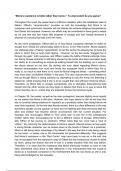Essay
A* A-level English Literature Essay 'The Handmaid's Tale' - Moira's resistance is futile rather than heroic
A full mark A* example essay which explores whether Moira's resistance was futile or heroic in 'The Handmaid's Tale'. A-level English Literature, social and political protest writing.
[Show more]




